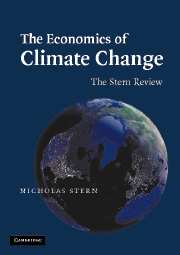Book contents
- Frontmatter
- Contents
- Preface
- Acknowledgements
- Introduction
- Summary of Conclusions
- Part I Climate Change – Our Approach
- Part II Impacts of Climate Change on Growth and Development
- Part III The Economics of Stabilisation
- Part IV Policy Responses for Mitigation
- Part V Policy Responses for Adaptation
- Part VI International Collective Action
- 21 Framework for Understanding International Collective Action for Climate Change
- 22 Creating a Global Price for Carbon
- 23 Supporting the Transition to a Low-Carbon Global Economy
- 24 Promoting Effective International Technology Co-operation
- 25 Reversing Emissions from Land Use Change
- 26 International Support for Adaptation
- 27 Conclusions: Building and Sustaining International Co-operation on Climate Change
- Abbreviations and Acronyms
- Postscript
- Technical Annex to Postscript
- Index
21 - Framework for Understanding International Collective Action for Climate Change
Published online by Cambridge University Press: 05 March 2014
- Frontmatter
- Contents
- Preface
- Acknowledgements
- Introduction
- Summary of Conclusions
- Part I Climate Change – Our Approach
- Part II Impacts of Climate Change on Growth and Development
- Part III The Economics of Stabilisation
- Part IV Policy Responses for Mitigation
- Part V Policy Responses for Adaptation
- Part VI International Collective Action
- 21 Framework for Understanding International Collective Action for Climate Change
- 22 Creating a Global Price for Carbon
- 23 Supporting the Transition to a Low-Carbon Global Economy
- 24 Promoting Effective International Technology Co-operation
- 25 Reversing Emissions from Land Use Change
- 26 International Support for Adaptation
- 27 Conclusions: Building and Sustaining International Co-operation on Climate Change
- Abbreviations and Acronyms
- Postscript
- Technical Annex to Postscript
- Index
Summary
KEY MESSAGES
Climate change mitigation raises the classic problem of the provision of a global public good. It shares some key characteristics with other environmental challenges that require the international management of common resources to avoid free riding.
International collective action is already taking place in a wide variety of forms, including multilateral, coordinated and parallel approaches.
Multilateral frameworks such as the UNFCCC and Kyoto Protocol provide an essential foundation to build further co-operation.
Partnerships, networks and organisations such as the International Energy Agency facilitate coordinated international action.
Mutual understanding of domestic policy goals supports further action: the EU, China, and California are amongst those that have adopted strong mandatory initiatives that will reduce the growth of greenhouse gas emissions.
Stronger, more coordinated action is required to stabilise concentrations of greenhouse gases in the atmosphere. Successful efforts in many areas, including the protection of the ozone layer, have demonstrated that international co-operation can overcome issues of free riding. Insights from game theory help to inform the design of frameworks for international action.
Countries usually honour international commitments where they conform to shared notions of responsible behaviour, even through international law provides weak tools to enforce co-operation. Existing multilateral frameworks can be enhanced by creating a shared understanding of long-term goals and responsible behaviour.
The transparency and comparability of national action across a range of dimensions of effort are key to mutual understanding and recognition of what others are doing, as well as ensuring public accountability.
- Type
- Chapter
- Information
- The Economics of Climate ChangeThe Stern Review, pp. 509 - 529Publisher: Cambridge University PressPrint publication year: 2007



